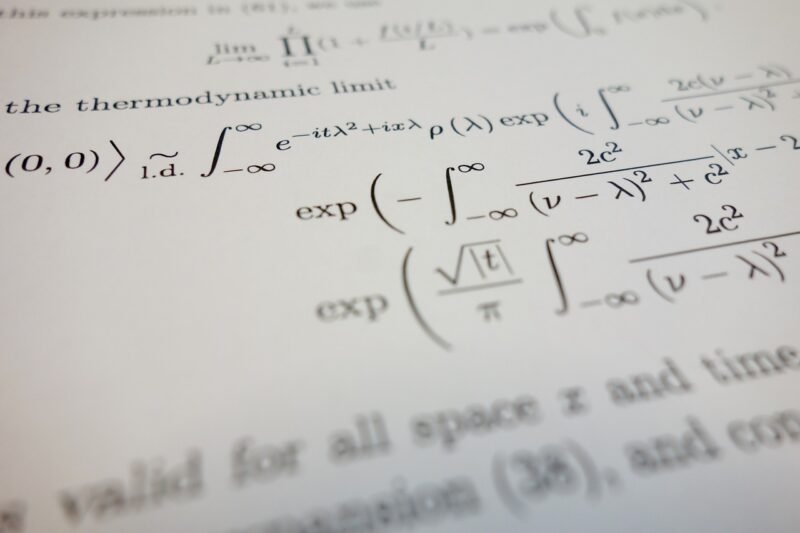Why Mathematics is Called the ‘Universal Language’ and Its Global Impact
November 12, 2024

Mathematics is often referred to as the ‘universal language’ because it transcends cultural, linguistic, and geographical barriers, serving as a common medium through which complex concepts can be communicated and understood worldwide. Its symbols, equations, and theorems speak a language that is consistent, allowing cooperation and comprehension across diverse disciplines and nations. This article delves into the reasons why mathematics holds this esteemed title and explores its profound impact on our global community.
1. The Nature of Mathematical Language
Mathematics is often described as a language for various reasons:
– Symbols and Notation: The symbols used in mathematics, such as numbers, operators, and variables, maintain consistent meanings regardless of the user’s native language. For example, the equation 2 + 2 = 4 expresses a fundamental truth of arithmetic that anyone familiar with this notation will understand.
– Logical Structure: Mathematics operates under a formal structure of logic and reasoning. Mathematical proofs demonstrate that certain conclusions can be reached through established premises, making it a universal framework for problem-solving.
– Abstraction: Mathematics employs abstract concepts that can apply across various fields. A formula derived in physics may find application in economics, demonstrating how interconnected knowledge can be.
These characteristics enable mathematics to function as a bridge among scientific disciplines, fostering collaboration and communication.
2. Mathematics in Science and Technology
Mathematics plays a critical role in the sciences and technology, supporting research and innovation in multiple areas:
– Physics: Physical laws, from Newton’s motion equations to Einstein’s theory of relativity, rely heavily on mathematical expressions. These equations not only describe the natural world but also predict outcomes accurately.
– Engineering: Engineers use mathematics for designing tools, structures, and systems. Calculations involving force, pressure, and energy are fundamental to their work, showcasing the practical applications of mathematical concepts.
– Computer Science: Algorithms, data structures, and computational theories are rooted in mathematics. The development of software, artificial intelligence, and data analysis techniques is fundamentally driven by mathematical principles.
Without mathematics, the advancements in these fields would not be possible. This reliance on mathematics underscores its universal importance in technological progress.
3. Mathematics in Everyday Life
Mathematics isn’t just confined to the realms of science and technology; it permeates our daily lives:
– Financial Literacy: Understanding budgets, taxes, and investments requires mathematical skills. Individuals use math to make informed financial decisions, varying from personal budgeting to retirement planning.
– Problem Solving: Everyday problem-solving often involves mathematical reasoning, whether it’s calculating the time needed for a trip, measuring ingredients for a recipe, or analyzing statistics in sports.
– Critical Thinking: Engaging with math encourages logical thinking, enabling individuals to approach problems methodically and make rational decisions, crucial skills in any aspect of life.
These examples illustrate how mathematics is woven into the fabric of our existence, further establishing its universality.
4. Mathematics as a Tool for Global Communication
One of the most significant impacts of mathematics being a universal language is its power to facilitate global communication:
– International Collaboration: In fields like space exploration or climate science, researchers from different countries must work together. Mathematics provides a common ground upon which collaborative projects can be established, ensuring that all contributors can understand and build on one another’s work.
– Global Standards: Organizations such as ISO (International Organization for Standardization) rely on mathematical frameworks to develop metrics and standards applicable globally. This fosters consistency in fields ranging from engineering to healthcare.
– Data Science and Statistics: The rise of big data has made statistics a critical part of decision-making in nearly every industry. Mathematical modeling allows organizations to analyze trends, forecast outcomes, and make informed choices based on quantitative data.
This shared understanding enables progress and innovation on a global scale, further highlighting the importance of mathematics in fostering international relationships.
5. Cultural Perspectives on Mathematics
Mathematics isn’t static; it evolves and adapts as cultures grow and change. Different cultures have made significant contributions to the field of mathematics:
– Ancient Civilizations: Ancient Egyptians and Babylonians established foundational mathematical concepts, many of which still underpin modern mathematics today. Their use of geometry, algebra, and number systems demonstrates a rich historical context.
– Indigenous Knowledge Systems: Various indigenous cultures have unique mathematical concepts, from counting systems to spatial awareness techniques. These perspectives broaden our understanding of what mathematics can encompass.
– Cross-Cultural Growth: The globalization of knowledge allows for the sharing of mathematical ideas, enhancing the discipline as cultures interact and learn from one another. For example, the adoption of Arabic numerals by European mathematicians significantly impacted mathematics in the West.
Understanding the cultural dimensions of mathematics enriches our appreciation of this universal language.
Conclusion
Mathematics is not just a subject learned in school; it is a universal language that influences every aspect of our lives. It serves as a medium for international discourse, fostering collaboration, innovation, and understanding in science, technology, and daily life. By bridging cultural divides and offering a framework for logical reasoning, mathematics ensures that ideas can be exchanged and expanded upon, thus driving global progress. As we continue to rely on mathematics in an increasingly interconnected world, its status as a universal language remains ever more relevant.
Whether you’re solving a puzzle, designing a new technology, or managing your personal finances, you are engaging with the universal language of mathematics. Embracing this language allows us to connect, communicate, and create in ways that can enhance our world.







